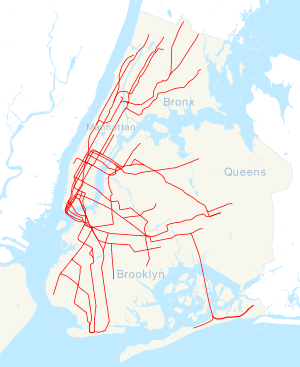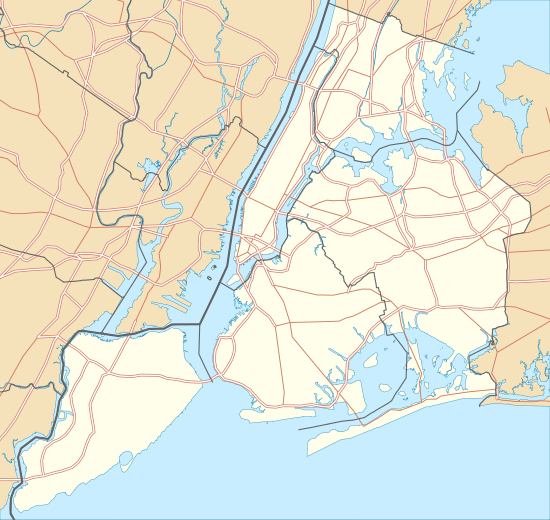Northern Boulevard (IND Queens Boulevard Line)
Northern Blvd | |||||||||||
|---|---|---|---|---|---|---|---|---|---|---|---|
|
| |||||||||||
|
Manhattan bound platform. | |||||||||||
| Station statistics | |||||||||||
| Address |
Northern Boulevard & Broadway Queens, NY 11377 | ||||||||||
| Borough | Queens | ||||||||||
| Locale | Woodside | ||||||||||
| Coordinates | 40°45′12″N 73°54′25″W / 40.753239°N 73.906918°WCoordinates: 40°45′12″N 73°54′25″W / 40.753239°N 73.906918°W | ||||||||||
| Division | B (IND) | ||||||||||
| Line | IND Queens Boulevard Line | ||||||||||
| Services |
E M R | ||||||||||
| Transit connections |
| ||||||||||
| Structure | Underground | ||||||||||
| Platforms | 2 side platforms | ||||||||||
| Tracks | 2 | ||||||||||
| Other information | |||||||||||
| Opened | August 19, 1933 | ||||||||||
| Station code | 269[1] | ||||||||||
| Wireless service |
| ||||||||||
| Traffic | |||||||||||
| Passengers (2017) |
2,140,551[4] | ||||||||||
| Rank | 231 out of 425 | ||||||||||
| Station succession | |||||||||||
| Next east |
65th Street: E | ||||||||||
| Next west |
46th Street: E | ||||||||||
| |||||||||||
| |||||||||||
| |||||||||||
Northern Boulevard is a local station on the IND Queens Boulevard Line of the New York City Subway. Located at the intersection of Northern Boulevard and Broadway, it is served by the M train on weekdays, the R train at all times except nights, and the E train at night.
History
The Queens Boulevard Line was one of the first lines built by the city-owned Independent Subway System (IND),[5][6][7] and stretches between the IND Eighth Avenue Line in Manhattan and 179th Street and Hillside Avenue in Jamaica, Queens.[5][7][8] The Queens Boulevard Line was in part financed by a Public Works Administration (PWA) loan and grant of $25,000,000.[9] One of the proposed stations would have been located at Northern Boulevard.
The first section of the line, west from Roosevelt Avenue to 50th Street, opened on August 19, 1933. E trains ran local to Hudson Terminal (today's World Trade Center) in Manhattan, while the GG (predecessor to current G service) ran as a shuttle service between Queens Plaza and Nassau Avenue on the IND Crosstown Line.[10][11][12][13][14][15]
Under the 2015–2019 MTA Capital Plan, the station, along with thirty other New York City Subway stations, will undergo a complete overhaul and would be entirely closed for up to 6 months. Updates would include cellular service, Wi-Fi, charging stations, improved signage, and improved station lighting.[16][17] However, these renovations are being deferred until the 2020–2024 Capital Program due to a lack of funding.[18]
Station layout
| G | Street Level | Exit/Entrance |
| B1 Platform level |
Side platform, doors will open on the right | |
| Southbound local | ← ← ← | |
| Northbound local | → → | |
| Side platform, doors will open on the right | ||
| B2 Express tracks |
Southbound express | ← |
| Northbound express | → | |
The station has two tracks and two side platforms. The express tracks are below the station and not visible from the platforms. West of the station, the express tracks turn south under Northern Boulevard. The tile band is Puce with a black border, and a number of replacement tiles in different shades of violet and purple have been placed during repairs. The station's name is abbreviated as "N BLVD" on the tile captions.
There are heavy columns across one part of the station, where the New York Connecting Railroad to the Hell Gate Bridge crosses over. There is an older style wooden token booth in the mezzanine of the uptown entrance.
In the western half of this station, the express tracks go underneath the local tracks to run along Northern Boulevard. A short distance east of here, the express tracks rise to the same level as the local tracks. To the south (geographical west) of this station, there is a single crossover connecting the two tracks.
There is an emergency exit at the western end of the Forest Hills-bound platform at this station, which leads to the D3 and D4 express tracks below.
Exits
The station's exits are at the western end at Northern Boulevard and Broadway. Fare controls are at platform level and there are no crossovers or crossunders. The booth on the southbound side is full-time. Each fare control area has one street stair. There are closed exits at the eastern end on both sides.[19] The IND "56th Street" direction tile and arrow are left intact on both platforms under the "Northern Blvd" tablet.
References
- ↑ "Station Developers' Information". Metropolitan Transportation Authority. Retrieved June 13, 2017.
- ↑ "NYC Subway Wireless – Active Stations". Transit Wireless Wifi. Retrieved May 18, 2016.
- ↑ More Subway Stations in Manhattan, Bronx in Line to Get Online, mta.info (March 25, 2015). "The first two phases included stations in Midtown Manhattan and all underground stations in Queens with the exception of the 7 Main St terminal."
- ↑ "Facts and Figures: Annual Subway Ridership 2012–2017". Metropolitan Transportation Authority. July 12, 2018. Retrieved July 12, 2018.
- 1 2 Duffus, R.L. (September 22, 1929). "OUR GREAT SUBWAY NETWORK SPREADS WIDER; New Plans of Board of Transportation Involve the Building of More Than One Hundred Miles of Additional Rapid Transit Routes for New York". The New York Times. Retrieved August 19, 2015.
- ↑ "QUEENS SUBWAY WORK AHEAD OF SCHEDULE: Completion Will Lead to Big Apartrnent Building, Says William C. Speers". The New York Times. April 7, 1929. Retrieved September 1, 2015.
- 1 2 "Queens Lauded as Best Boro By Chamber Chief". Brooklyn Daily Eagle. September 23, 1929. p. 40. Retrieved October 4, 2015 – via Newspapers.com.
- ↑ New York Times, New Subway Routes in Hylan Program to Cost $186,046,000, March 21, 1925, page 1
- ↑ "TEST TRAINS RUNNING IN QUEENS SUBWAY; Switch and Signal Equipment of New Independent Line Is Being Checked". The New York Times. December 20, 1936. ISSN 0362-4331. Retrieved April 26, 2016.
- ↑ Kramer, Frederick A. (1990). Building the Independent Subway. Quadrant Press. ISBN 978-0-915276-50-9.
- ↑ Raskin, Joseph B. (November 1, 2013), The Routes Not Taken: A Trip Through New York City's Unbuilt Subway System, Fordham University Press, ISBN 978-0-8232-5369-2
- ↑ "Independent Subway Services Beginning in 1932". thejoekorner.com. August 21, 2013. Retrieved August 2, 2015.
- ↑ "TWO SUBWAY UNITS OPEN AT MIDNIGHT; Links in City-Owned System in Queens and Brooklyn to Have 15 Stations" (PDF). The New York Times. August 18, 1933. Retrieved November 7, 2015.
- ↑ "New Queens Subway Service Will Be Launched Tonight; Tunnel From Manhattan Open to Jackson Heights; Service Will Eventually Be Extended Through To Jamaica". Long Island Daily Press. Fultonhistory.com. August 18, 1933. p. 20. Retrieved July 27, 2016.
- ↑ "New Queens Tube To Open Saturday: Brooklyn-Long Island City Link of City Line Also to Be Put in Operation". New York Evening Post. Fultonhistory.com. August 17, 1933. p. 18. Retrieved July 27, 2016.
- ↑ "MTA Will Completely Close 30 Subway Stations For Months-Long "Revamp"". Gothamist. Archived from the original on August 1, 2016. Retrieved July 18, 2016.
- ↑ "MTAStations" (PDF). governor.ny.gov. Government of the State of New York. Retrieved July 18, 2016.
- ↑ Berger, Paul (2018-04-03). "New York Subway Cuts Back Plans to Renovate Stations". Wall Street Journal. ISSN 0099-9660. Retrieved 2018-04-03.
- ↑ "MTA Neighborhood Maps: Astoria" (PDF). Metropolitan Transportation Authority. 2015. Retrieved September 27, 2015.
External links
| Wikimedia Commons has media related to Northern Boulevard (IND Queens Boulevard Line). |
- nycsubway.org – IND Queens Boulevard Line: Northern Boulevard
- Station Reporter — R Train
- Station Reporter — M Train
- The Subway Nut — Northern Boulevard Pictures
- Northern Boulevard entrance from Google Maps Street View
- Platforms from Google Maps Street View



